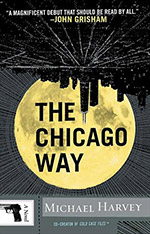This is a stunning debut novel. Featuring Chicago P.I. Michael Kelly, Harvey manages to take the very tired old formula, initiated by Raymond Chandler, and somehow make it fresh and new. His P.I. is a tough Irish ex-cop, with an educated heart of gold. He reads Aeschylus in his spare time. The vengeful, bloodthirsty stories told by the ancient Greeks have plenty of relevance in Kelly’s 21st century life.
 We’re introduced to Kelly in the most classic of ways: his old partner walks into his office and asks for his help. Neither the P.I. or the cop code of honor allows not helping out an old partner, and Kelly is all in. The story his old buddy, Gibbons, has to tell is horrible and gripping enough to get anyone’s attention. Gibbons has always been haunted by the brutal rape of a young woman who was stabbed while it happened and left for dead. She’s reached out to him and asked for his help in finding her rapist, who was never caught. Gibbons had been talked into forgetting the rape by his superiors, but a letter from the victim is a whole other story. He wants someone from outside the department to help.
We’re introduced to Kelly in the most classic of ways: his old partner walks into his office and asks for his help. Neither the P.I. or the cop code of honor allows not helping out an old partner, and Kelly is all in. The story his old buddy, Gibbons, has to tell is horrible and gripping enough to get anyone’s attention. Gibbons has always been haunted by the brutal rape of a young woman who was stabbed while it happened and left for dead. She’s reached out to him and asked for his help in finding her rapist, who was never caught. Gibbons had been talked into forgetting the rape by his superiors, but a letter from the victim is a whole other story. He wants someone from outside the department to help.
Kelly takes the file Gibbons gives him and begins to turn over rocks. Much like the ancient Greek stories that inspire him, Harvey’s story is both simple and complex. The emotional strands are dark, strong, and twisted; the surface story is basic private eye. Gibbons, of course, turns up dead in chapter two and Kelly is initially accused of the crime, though of course he’s been framed. Who has framed him and why is at the heart of the story though it takes the whole book to get you there.
Harvey also has some things to say about rape. Maybe they’ve been said before, but they’re said very effectively here, and they give the book a very honed point of view that gives it a real edge. Sexual assault seems to turn up everywhere and no matter how it turns up, it’s gut wrenchingly terrible. The thing is that Harvey manages to write about it in such a non-prurient and matter of fact way that what he’s saying really sticks with you. The only other book I’ve read about rape that was as effective and moving was by Harvey’s fellow Chicagoan, Theresa Schwegel, whose brilliant Last Known Address (2009) is a punishing look at the investigative side of rape.
Being about rape also means this book is about violence and betrayal. The creepy way the original victim comes out of the woodwork makes your skin crawl even while you feel for her, and Harvey has a beautiful piece of writing where he considers the choices and decisions this woman might make and the different directions they might take her: “Lung cancer in a trailer park or a home in La Jolla. The choice was there.” Somehow you feel in your gut that the trailer park is the eventual destination.
Meanwhile Kelly continues to turn over rocks, leading him to different discoveries of corruption both high and low. The connections he has with the various women in his life are complicated and multi-dimensional. The story is fast paced and brutal, and it doesn’t let up until the very last page. It’s energized by Harvey’s clear, crisp, and memorable prose. Luckily there are three more books in the Michael Kelly series and a new stand alone novel to look forward to from this very gifted writer.